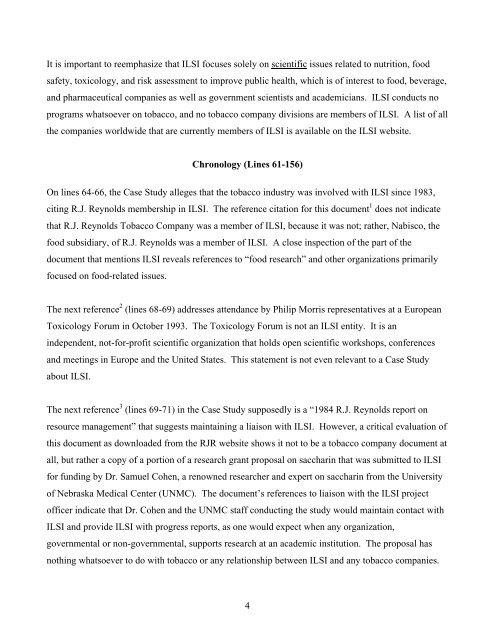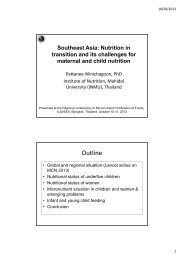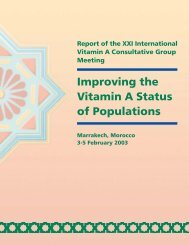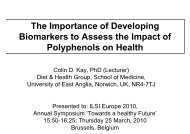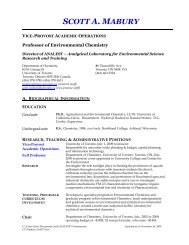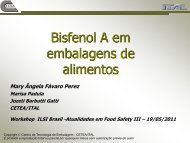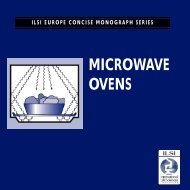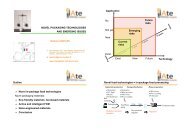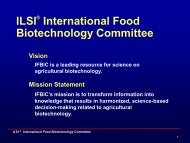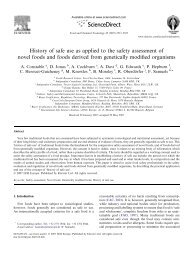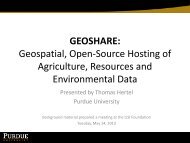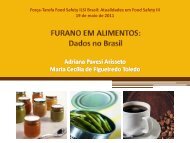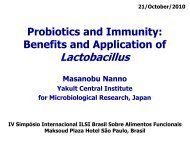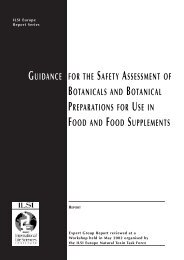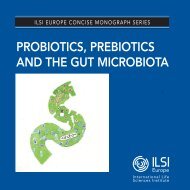ILSI, Tobacco, and the World Health Organization - International Life ...
ILSI, Tobacco, and the World Health Organization - International Life ...
ILSI, Tobacco, and the World Health Organization - International Life ...
You also want an ePaper? Increase the reach of your titles
YUMPU automatically turns print PDFs into web optimized ePapers that Google loves.
It is important to reemphasize that <strong>ILSI</strong> focuses solely on scientific issues related to nutrition, foodsafety, toxicology, <strong>and</strong> risk assessment to improve public health, which is of interest to food, beverage,<strong>and</strong> pharmaceutical companies as well as government scientists <strong>and</strong> academicians. <strong>ILSI</strong> conducts noprograms whatsoever on tobacco, <strong>and</strong> no tobacco company divisions are members of <strong>ILSI</strong>. A list of all<strong>the</strong> companies worldwide that are currently members of <strong>ILSI</strong> is available on <strong>the</strong> <strong>ILSI</strong> website.Chronology (Lines 61-156)On lines 64-66, <strong>the</strong> Case Study alleges that <strong>the</strong> tobacco industry was involved with <strong>ILSI</strong> since 1983,citing R.J. Reynolds membership in <strong>ILSI</strong>. The reference citation for this document 1 does not indicatethat R.J. Reynolds <strong>Tobacco</strong> Company was a member of <strong>ILSI</strong>, because it was not; ra<strong>the</strong>r, Nabisco, <strong>the</strong>food subsidiary, of R.J. Reynolds was a member of <strong>ILSI</strong>. A close inspection of <strong>the</strong> part of <strong>the</strong>document that mentions <strong>ILSI</strong> reveals references to “food research” <strong>and</strong> o<strong>the</strong>r organizations primarilyfocused on food-related issues.The next reference 2 (lines 68-69) addresses attendance by Philip Morris representatives at a EuropeanToxicology Forum in October 1993. The Toxicology Forum is not an <strong>ILSI</strong> entity. It is anindependent, not-for-profit scientific organization that holds open scientific workshops, conferences<strong>and</strong> meetings in Europe <strong>and</strong> <strong>the</strong> United States. This statement is not even relevant to a Case Studyabout <strong>ILSI</strong>.The next reference 3 (lines 69-71) in <strong>the</strong> Case Study supposedly is a “1984 R.J. Reynolds report onresource management” that suggests maintaining a liaison with <strong>ILSI</strong>. However, a critical evaluation ofthis document as downloaded from <strong>the</strong> RJR website shows it not to be a tobacco company document atall, but ra<strong>the</strong>r a copy of a portion of a research grant proposal on saccharin that was submitted to <strong>ILSI</strong>for funding by Dr. Samuel Cohen, a renowned researcher <strong>and</strong> expert on saccharin from <strong>the</strong> Universityof Nebraska Medical Center (UNMC). The document’s references to liaison with <strong>the</strong> <strong>ILSI</strong> projectofficer indicate that Dr. Cohen <strong>and</strong> <strong>the</strong> UNMC staff conducting <strong>the</strong> study would maintain contact with<strong>ILSI</strong> <strong>and</strong> provide <strong>ILSI</strong> with progress reports, as one would expect when any organization,governmental or non-governmental, supports research at an academic institution. The proposal hasnothing whatsoever to do with tobacco or any relationship between <strong>ILSI</strong> <strong>and</strong> any tobacco companies.4


